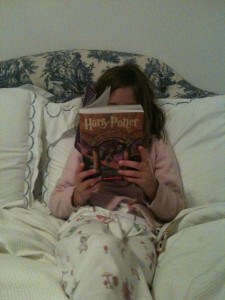Today: Book. What book – fiction or non – touched you?
Really really hard to pick just one! So I think I will pick two. Neil Stephenson’s Anathem and Michael Ondaatje’s Divisadero.
Anathem is thick, dense, and comes with a 30+ page glossary of the invented words that populate its pages. The story is ostensibly a science fiction tale set in the future, though I could not shake the feeling as I read that it was actually many decades ago, set in a monastery in Europe. I am still not sure that I understood even half of this book’s layers, so I am not confident writing about it. Stephenson includes dazzling numbers of references, arcane and complex, in his story. There is art, there is math, there is science, there is astronomy, there is religion.
The title alone fascinates me. It seems an amalgam of an anthem and anathema. An anthem about an anathema? I don’t know. I rolled the word over and over in my mouth, in my brain. I still think it is lovely, mysterious, opaque.
Anathem dares to explore and anticipate nothing less than the end of the world. Its themes include the meaning of humanity, whether or not God exists, questions of identity in a world of rigorously-defined social strata, the crucial importance of thoughtful, dogged scientific inquiry, and the uncertainty of who you can trust and who you can’t. The book’s language is baroque, its story labyrinthine. I still cannot stop thinking about it.
A few short quotes:
It’s what you don’t expect that … most needs looking for.
Just aiming a speely input device, or a Farspark chambre, or whatever you call it… a speelycaptor… at something doesn’t collect what is meaningful to me. I need someone to gather it in with all their senses, mix it round in their head, and make it over into words.
They knew many things but had no idea why. And strangely this made them more, rather than less, certain that they were right.
Wrung out, purified, shaky but stronger.
… when I saw any of those kinds of beauty I knew I was alive, and not just in the sense that when I hit my thumb with a hammer I knew I was alive, but rather in the sense that I was partaking of something–something was passing through me that it was in my nature to be a part of.
Divisadero. Ondaatje is probably my favorite living writer, just for the sheer, audacious gorgeousness of his writing. Language is like leaping flame in his hands. The other writer I feel this way about right now is Annie Dillard. With Divisadero, I had the same experience I have had with other Ondaatje works of falling headfirst into his glorious world of language and imagery, of consuming a book that is as much poetry as it is novel, as much musing on life itself as it is fiction.
Ondaatje’s writing is clear, declarative, and simple, yet at the same time evocative and rich with imagery. How he accomplishes this shimmering lyricism with language that is not flowery or overwrought is nothing short of magic. Sentences of his line up in my mind, repeating themselves over and over almost every day (“the heart is an organ of fire,” “she was within him now,” “do you understand the sadness of geography?”).
The book is more a series of linked narratives than a traditional novel. It explores themes as central to the human experience as the definition of family and how early experiences in our lives can echo through the rest of our days. Divisadero just took hold of my imagination and did not let go. I finished it in an afternoon, and that night as I fell asleep I wondered why the book didn’t positively glow on the bureau, so luminous is the writing inside. What a genius this man is.
As I read I underlined passages that I loved (as I always do) and last night I transferred them into a Word document. Which was four pages once I was finished. I will try to be careful in selecting only the very best to share here. After all, it is more compelling to let Ondaatje’s mastery speak for itself than to continue trying, in my ham-handed fashion, to describe it.
Everything is biography, Lucian Freud says. What we make, why it is made, how we draw a dog, who it is we are drawn to, why we cannot forget. Everything is a collage, even genetics. There is the hidden presence of others in us, even those we have known briefly. We contain them for the rest of our lives, at every border we cross.
Going after lost things was as uncertain as prayer.
So there had always been and perhaps always would be a maze of unmarked roads between her and others.
… how to see that the present continually altered the past, just as the past was a strange inheritance that fell upside down into one’s life like an image through a camera obscura. All that was consistent was a principle … He did not know whether she was a lens to focus the past or a fog to obliterate it.
She’d lived one of her essential lives with Coop, and she could never dismantle herself from him.
In spite of her desire for a contained universe, her life felt scattered, full of many small moments, without great purpose. That is what she thought, though what is most untrustworthy about our natures and self-worth is how we differ in our own realities from the way we are seen by others.
And they saw that anything, everything, could be taken away, there was nothing that could be held on to except each other in this iron-like world that appeared to stretch out for the rest of their lives.
There was in the end an order, even to this.
His thoughts and emotions were loose in him, random, similar to the abrupt cuts of light in the sky.
For the raw truth of an episode never ends, just as the terrain of my sister’s life and the story of my time with Coop are endless to me.


